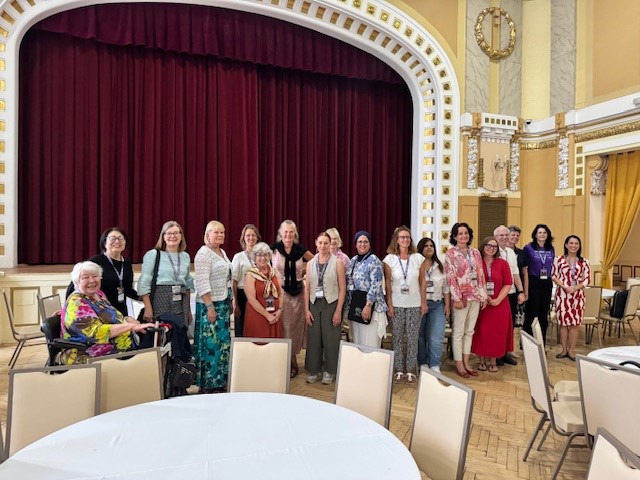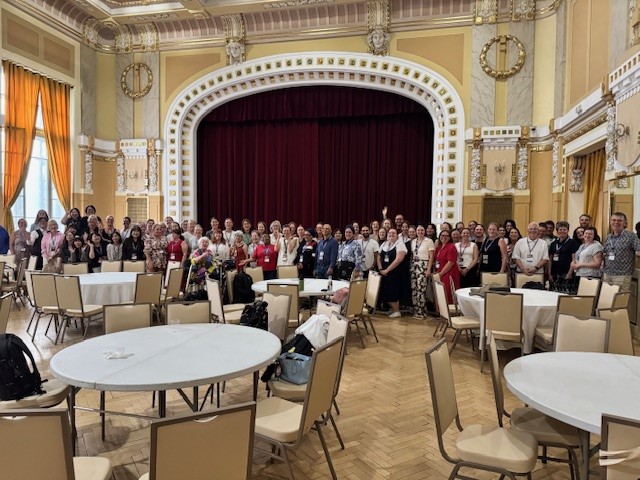Country Coordinators
The European Early Childhood Education Research Association (EECERA) has established the role of Country Coordinator (CoCo) to support its mission at a national and regional level. Country Coordinators serve as local representatives who promote the Association’s work and connect early childhood professionals and researchers within their countries to EECERA’s international network.
At the Board of Trustees meeting in Braga, May 2025, the role of Country Coordinators was reviewed and updated to provide clearer responsibilities, increased visibility, and formal recognition for their valuable contributions.

CoCos at EECERA 2025 in Bratislava, Solvakia.
Purpose of the Country Coordinator Role:
Country Coordinators are appointed to support EECERA in its aims to:
- Raise the visibility, status, and impact of EECERA within their country or region.
- Promote and support national participation in EECERA activities and initiatives.
- Build and coordinate networks of early childhood education and care (ECEC) researchers, practitioners, and policymakers.
- Encourage engagement with EECERA resources, including the journal, book series, annual conference, and newsletter.
- Act as intermediaries between local professionals and EECERA’s leadership and scholarly platforms.

Coco’s and conference attendees at the Meet Your CoCo event at EECERA 2025.
Key Responsibilities:
Country Coordinators work closely with the EECERA Executive and Trustees to:
- Serve as a conduit for feedback, advice, and observations from national EECERA members.
- Disseminate information about EECERA activities, publications, and events within their country.
- Support and promote the development of EECERA Special Interest Groups (SIGs) and local research networks.
- Encourage local early childhood professionals to participate in EECERA conferences and to publish in the EECER Journal and book series.
- Provide contact information and a national link for the EECERA website:
https://www.eecera.org/country-coordinators/ - Offer assistance with translating EECERA materials into national languages, where possible.
Expectations of Country Coordinators:
To maintain an active status, Country Coordinators are expected to:
- Proactively carry out the responsibilities listed above.
- Submit an Annual Activity Update by 31st January each year detailing activities and achievements, with supporting evidence.
- Remain in regular contact with the EECERA Trustee responsible for Country Coordinators (Maelis Karlsson Lohmander)
- Please note: Failure to submit Annual Activity Updates for three consecutive years will result in removal from the list of active Country Coordinators.
Benefits of Being a Country Coordinator:
Country Coordinators receive several benefits in recognition of their contribution:
- Free online access to the EECER Journal and its full back catalogue and a free e-book for each year they are active.
- Support from EECERA’s administrative team.
- Eligibility to join the EECERA Electoral College after three years in the role and with a maintained membership.
Membership in the Electoral College may lead to eligibility for appointment to the EECERA Board of Trustees. (To be confirmed by EECERA.)
How to Become a Country Coordinator:
If you’re interested in representing your country as a CoCo, please complete the form:
‘CoCo report submission form’ – available on the right-hand side of this page.
To be considered, applicants must:
- Be a resident of the country they wish to represent.
- Be actively involved in the Early Childhood Education and Care sector.
- Have contributed to research, policy, or practice in the field.
It would be desirable to have some knowledge of EECERA by involvement with the Association e.g. attending conferences, participating in a SIG group, publishing through our platforms etc.
In cases where multiple candidates apply from the same country, the EECERA Board of Trustees will make the final decision regarding the appointment.
We invite other EECERA members and stakeholders to support their national CoCos and help grow the EECERA community across Europe and beyond.
Information
Country Coordinator Resources
Country Coordinators’ Annual report form
Blog Guidelines for Country Coordinators
